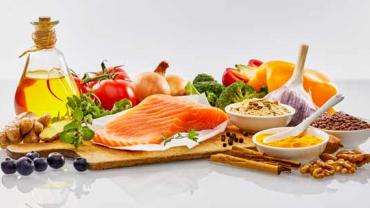
We recently looked at the role of the gut microbiome in non-alcoholic fatty liver disease (NAFLD). Now we’ll look at a review published last week in Nutrients, where researchers evaluated various dietary approaches for the potential support of NAFLD. Keep in mind that, at this time there are few guidelines for diagnostic and follow up methods, and limited proven solutions.
This review included six randomized controlled trials including 317 patients with NALFD. Each study ranged from 12 to 98 patients with 50 patients being the average. These studies ranged over a period from 6 weeks to 6 months. The primary outcome of interest was a reduction in hepatic steatosis based on imaging or biopsy. In addition, other outcomes investigated were changes in hepatic fibrosis, reduction in liver enzymes, and weight reduction. Five out of the 6 studies evaluated the effects of a Mediterranean diet, while the remaining study investigated modified alternate-day calorie restriction, which is a type of intermittent fasting. These were compared to other dietary interventions including a low fat diet, low carbohydrate diet, and usual care. Hepatic steatosis was assessed by magnetic resonance spectroscopy or ultrasound in 5 of the 6 studies. Liver stiffness was measured using shear wave elastography in 4 of the 6 studies.
A significant reduction in hepatic steatosis was seen in 3 of the 5 studies following a Mediterranean Diet and in the one study evaluating a low-carbohydrate diet. Two study arms included a low-fat diet; however, only one of these reached a significant reduction in hepatic steatosis. The study with an intermittent-fasting arm also demonstrated a significant improvement in hepatic steatosis. Four studies evaluated liver stiffness with 2 of the 3 Mediterranean diets showing a significant improvement. All six studies evaluated the impact on liver enzymes but only half of these studies showed a significant improvement. It is important to note that patients achieved weight loss in all of these studies with significant weight loss in 5 of the 6 studies.
Individuals with NAFLD have established disease and nutritional demands beyond what could be obtained from the diet alone; therefore, dietary supplements should also be considered to help reduce the progression of the disease and improve liver function. Nutrients to consider include, probiotics, delta and gamma tocotrienols, fiber, resistant startch, fish oil, CoQ10, berberine, and milk thistle.
By Michael Jurgelewicz, DC, DACBN, DCBCN, CNS